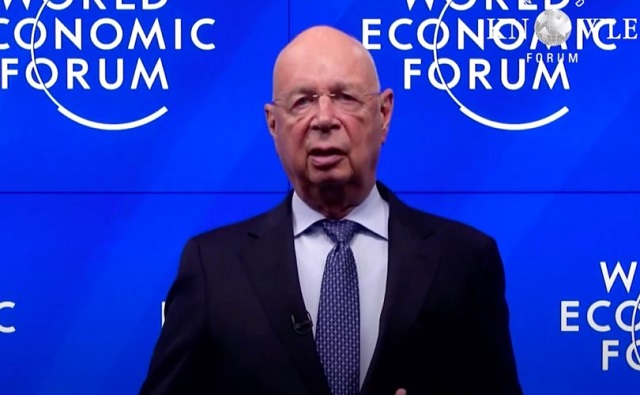Great Reset
Dr. Robert Malone reacts to Klaus Schwab’s resignation: ‘Resistance is not futile’

From LifeSiteNews
They will try to become a behind-the-scenes power player once again after Schwab’s rule has ended. It is our job to not let that happen.
The leader and founder of the World Economic Forum, Klaus Schwab, is leaving his executive role and transitioning to a “non-executive chairman role” in 2025.
The truth is that Børge Brende, president of the World Economic Forum, already leads the day-to-day operations. Mr. Brende is a smart, sophisticated Norwegian negotiator with a proven track record, and he is primed to take on an even bigger role in the organization. His involvement in the Bilderberg meetings, including service on their steering committee and various roles within the United Nations, including Chairman of the U.N. Commission of Sustainable Development (2003-04), attest to his ability to build power and influence. He is the natural successor to Klaus’s vaulted title of executive chairman.
Schwab is an excellent cut-out villain cartoon character with his Germanic, authoritarian, and overbearing demeanor. He comes across as a two-dimensional figure, driven by corporatism and power, which makes him an easy target to hate. But the truth is that he has been co-opting and coercing national leaders for decades.
The Malone Institute put together a list of all the WEF Young Leaders Graduates and a list of U.S. politicians who are graduates of the five-year long young leaders program, which can be found here.
Without Schwab at the helm, it will be harder to hold the WEF accountable for its corporatist agenda, that is, a corporate governance of world affairs driven by its globalist mindset.
I predict that under Brende, the WEF will try to garner more power and influence among the “middle powers” (smaller nation-states), as the ability for more regulatory capture within the superpowers is already maxed out. As the middle powers crave a bigger and more important role on the world stage, they are an easy target for the WEF transnational corporations.
Already, the WEF website is courting these players as the next wave of world leaders. The WEF website states: “middle powers and regional groupings are emerging as alternative axes in today’s multipolar world.” By aligning these middle powers with the WEF, the corporatists will increase their wealth and power.
Some of the recent WEF articles on “middle powers” include:

Furthermore, I believe that in the future, the WEF will work to downplay the Davos-man opulent parties, opting instead for more exclusive and private venues – where the press isn’t invited, as is the case with the Bilderberg meetings. The WEF leadership knows that they have a PR problem with the populist (center-right, libertarian, and conservative parties) throughout the world, and Brende will act quickly to try to fix this. It will require a public relations overhaul of Klaus Schwab’s flagship policy agenda, which the WEF calls stakeholder capitalism. This, of course, is just another word for corporatism, whereby there is a fusion of the unelected global leadership and transnational corporations in order for the largest corporations in the world access to enough power to rule the world. For our own good, of course!
The World Economic Forum is a tool for corporate globalists to rule the world through inverse totalitarianism. In effect, our nation, as well as many other nation-states, have been turned upside down while being captured by corporate interests that endorse authoritarian policies – hence “inverted totalitarianism.”
Here we are today. In many ways, the hidden head of this unelected corporatist government structure is now the leadership of the World Economic Forum. This is where the heads of corporations, politicians, and other wealthy elites meet to decide the governing decisions of the world. A trade union of the thousand largest corporations in the world.
Resistance has begun, which is what makes the WEF so scared and defensive. That is why the WEF will have a facelift as soon as Schwab’s rule has ended. The WEF will try to become a behind-the-scenes power player once again. The hand inside the glove. It is our job to not let that happen.
This is why government, corporate interests, and “mainstream” media find alternate social media platforms that they can’t control to be so threatening. They know social media, and the populist parties associated with it, are a threat to the corporatist globalist structure they have built over decades. They are worried that it is in danger of crumbling.
Resistance is not futile.
Reprinted with permission from Robert Malone.
Banks
Wall Street Clings To Green Coercion As Trump Unleashes American Energy


From the Daily Caller News Foundation
By Jason Isaac
The Trump administration’s recent move to revoke Biden-era restrictions on energy development in Alaska’s North Slope—especially in the Arctic National Wildlife Refuge (ANWR)—is a long-overdue correction that prioritizes American prosperity and energy security. This regulatory reset rightly acknowledges what Alaska’s Native communities have long known: responsible energy development offers a path to economic empowerment and self-determination.
But while Washington’s red tape may be unraveling, a more insidious blockade remains firmly in place: Wall Street.
Despite the Trump administration’s restoration of rational permitting processes, major banks and insurance companies continue to collude in starving projects of the capital and risk management services they need. The left’s “debanking” strategy—originally a tactic to pressure gun makers and disfavored industries—is now being weaponized against American energy companies operating in ANWR and similar regions.
Dear Readers:
As a nonprofit, we are dependent on the generosity of our readers.
Please consider making a small donation of any amount here. Thank you!
This quiet embargo began years ago, when JPMorgan Chase, America’s largest bank, declared in 2020 that it would no longer fund oil and gas development in the Arctic, including ANWR. Others quickly followed: Goldman Sachs, Wells Fargo, and Citigroup now all reject Arctic energy projects—effectively shutting down access to capital for an entire region.
Insurers have joined the pile-on. Swiss Re, AIG, and AXIS Capital all publicly stated they would no longer insure drilling in ANWR. In 2023, Chubb became the first U.S.-based insurer to formalize its Arctic ban.
These policies are not merely misguided—they are dangerous. They hand America’s energy future over to OPEC, China, and hostile regimes. They reduce competition, drive up prices, and kneecap the very domestic production that once made the U.S. energy independent.
This isn’t just a theoretical concern. I’ve experienced this discrimination firsthand.
In February 2025, The Hartford notified the American Energy Institute—an educational nonprofit I lead—that it would not renew our insurance policy. The reason? Not risk. Not claims. Not underwriting. The Hartford cited our Facebook page.
“The reason for nonrenewal is we have learned from your Facebook page that your operations include Trade association involved in promoting social/political causes related to energy production. This is not an acceptable exposure under The Hartford’s Small Commercial business segment’s guidelines.”
That’s a direct quote from their nonrenewal notice.
Let’s be clear: The Hartford didn’t drop us for anything we did—they dropped us for what we believe. Our unacceptable “exposure” is telling the truth about the importance of affordable and reliable energy to modern life, and standing up to ESG orthodoxy. We are being punished not for risk, but for advocacy.
This is financial discrimination, pure and simple. What we’re seeing is the private-sector enforcement of political ideology through the strategic denial of access to financial services. It’s ESG—Environmental, Social, and Governance—gone full Orwell.
Banks, insurers, and asset managers may claim these decisions are about “climate risk,” but they rarely apply the same scrutiny to regimes like Venezuela or China, where environmental and human rights abuses are rampant. The issue is not risk. The issue is control.
By shutting out projects in ANWR, Wall Street ensures that even if federal regulators step back, their ESG-aligned agenda still moves forward—through corporate pressure, shareholder resolutions, and selective financial access. This is how ideology replaces democracy.
While the Trump administration deserves praise for removing federal barriers, the fight for energy freedom continues. Policymakers must hold financial institutions accountable for ideological discrimination and protect access to banking and insurance services for all lawful businesses.
Texas has already taken steps by divesting from anti-energy financial firms. Other states should follow, enforcing anti-discrimination laws and leveraging state contracts to ensure fair treatment.
But public pressure matters too. Americans need to know what’s happening behind the curtain of ESG. The green financial complex is not just virtue-signaling—it’s a form of economic coercion designed to override public policy and undermine U.S. sovereignty.
The regulatory shackles may be coming off, but the private-sector blockade remains. As long as banks and insurers collude to deny access to capital and risk protection for projects in ANWR and beyond, America’s energy independence will remain under threat.
We need to call out this hypocrisy. We need to expose it. And we need to fight it—before we lose not just our energy freedom, but our economic prosperity.
The Honorable Jason Isaac is the Founder and CEO of the American Energy Institute. He previously served four terms in the Texas House of Representatives.
Censorship Industrial Complex
China announces “improvements” to social credit system

 MxM News
MxM News
Quick Hit:
Beijing released new guidelines Monday to revamp its social credit system, promising stronger information controls while deepening the system’s reach across China’s economy and society. Critics say the move reinforces the Communist Party’s grip under the banner of “market efficiency.”
Key Details:
- The guideline was issued by top Chinese government and Communist Party offices, listing 23 measures to expand and standardize the social credit system.
- It aims to integrate the credit system across all sectors of China’s economy to support what Beijing calls “high-quality development.”
- Officials claim the new framework will respect information security and individual rights—despite growing global concerns over surveillance and state overreach.
Diving Deeper:
China is doubling down on its social credit system with a newly issued guideline meant to “improve” and expand the controversial surveillance-driven program. Released by both the Communist Party’s Central Committee and the State Council, the document outlines 23 specific measures aimed at building a unified national credit system that will touch nearly every corner of Chinese society.
Framed as a tool for “high-quality development,” the guideline declares that credit assessments will increasingly shape the rules of engagement for businesses, government agencies, and individual citizens. The system, according to the National Development and Reform Commission (NDRC), has already played a role in shaping China’s financial services, government efficiency, and business environment.
Critics of the social credit system have long warned that it serves as an instrument of authoritarian control—monitoring citizens’ behavior, punishing dissent, and rewarding obedience to the Communist Party. By integrating credit data across all sectors and enforcing a “shared benefits” model, the new guideline appears to entrench, not ease, the Party’s involvement in everyday life.
Still, Beijing is attempting to temper foreign and domestic concerns over privacy. The NDRC emphasized that the system is being built on the “fundamental principle” of protecting personal data. Officials pledged to avoid excessive data collection and crack down on any unlawful use of information.
-

 2025 Federal Election1 day ago
2025 Federal Election1 day agoMark Carney refuses to clarify 2022 remarks accusing the Freedom Convoy of ‘sedition’
-

 2025 Federal Election2 days ago
2025 Federal Election2 days agoPoilievre To Create ‘Canada First’ National Energy Corridor
-

 Bruce Dowbiggin2 days ago
Bruce Dowbiggin2 days agoAre the Jays Signing Or Declining? Only Vladdy & Bo Know For Sure
-

 2025 Federal Election2 days ago
2025 Federal Election2 days agoFixing Canada’s immigration system should be next government’s top priority
-

 2025 Federal Election13 hours ago
2025 Federal Election13 hours agoDon’t let the Liberals fool you on electric cars
-

 Catherine Herridge12 hours ago
Catherine Herridge12 hours agoFBI imposed Hunter Biden laptop ‘gag order’ after employee accidentally confirmed authenticity: report
-

 International15 hours ago
International15 hours agoTrump’s ‘Golden Dome’ defense shield must be built now, Lt. Gen. warns
-

 Daily Caller1 day ago
Daily Caller1 day agoBiden Administration Was Secretly More Involved In Ukraine Than It Let On, Investigation Reveals


